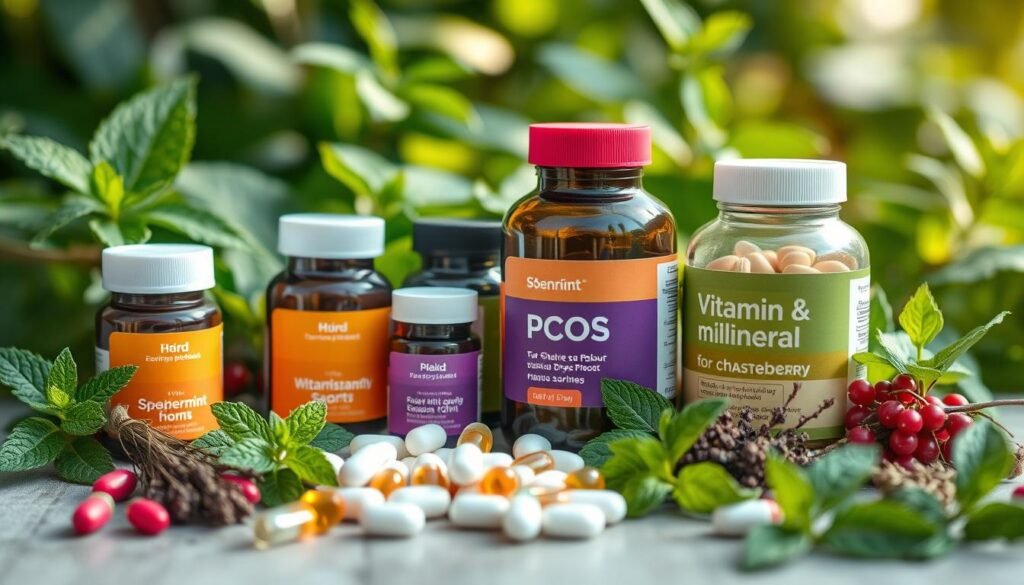Up to 10% of women in their childbearing years suffer from Polycystic Ovary Syndrome (PCOS). It’s the most common hormonal and metabolic disorder among them. Understanding PCOS is crucial. It shows how dietary supplements are key in easing its symptoms. The right supplements for PCOS help with hormonal balance and greatly boost a woman’s life quality.
PCOS brings a lot of challenges. Women may face irregular periods, high insulin levels, and weight gain. These issues make it tough to keep hormones in check and stay healthy. But, with the right vitamins and minerals, women can start to control their PCOS. Science-backed supplements provide a big help in this journey.
Let’s explore supplements like inositol and vitamin D. They are crucial in managing PCOS. Knowing about these supplements gives power to women. It leads to improved health that fits their unique conditions.
Key Takeaways
- PCOS affects up to 10% of women of childbearing age.
- The best supplements for PCOS can help ease symptoms like insulin resistance and weight gain.
- Inositol improves insulin sensitivity and helps with ovulation.
- A lot of women with PCOS lack vitamin D, but supplements can fix that.
- Omega-3 fatty acids fight insulin resistance and boost mood.
Understanding Polycystic Ovary Syndrome (PCOS)
Polycystic Ovary Syndrome (PCOS) is a common endocrine disorder. It affects about 5 to 10% of women who are of reproductive age in the United States. PCOS involves hormonal imbalances and irregular ovulation. It can also lead to polycystic ovaries, seen via ultrasound.
This disorder greatly affects women’s health, risking obesity, type 2 diabetes, and more heart issues. Hormonal imbalances are key in PCOS’s development. It’s vital for those suffering to find effective treatments. Almost 70% of women with PCOS have insulin resistance, studies show.
Treatment strategies often include supplementing to ease symptoms. Deficiencies in myo-inositol and vitamin D can worsen PCOS issues. Adding certain supplements might help balance these hormones and improve patient conditions. For more on managing PCOS with supplements like insulin sensitizers and vitamins, see this research.
Common Symptoms of PCOS
Polycystic Ovary Syndrome (PCOS) touches 6-12% of women in the U.S., ages 15-44. Its symptoms vary, making diagnosis and treatment tricky. Many report issues like irregular periods, excess hair growth, acne, added weight, and trouble having children.
Irregular periods mean cycles might last longer than 28 days or not come at all. This can make having a baby difficult since ovulation becomes unpredictable. High androgen levels lead to hirsutism, causing unwanted hair growth. This can hurt how women see themselves and feel.
PCOS brings more than these known symptoms. It raises the risks for diabetes, heart disease, and other health issues. Early symptom recognition is key. It helps in getting the right diagnosis and starting treatment, which might include changing lifestyles or adding supplements.
Checking for PCOS involves blood work and ultrasound exams. Knowing these symptoms helps women seek the medical help they need on time.
How Diet and Lifestyle Affect PCOS
A good diet is key for controlling PCOS symptoms. Eating less refined carbs and more whole foods boosts your metabolic health. This way of eating helps with weight and improves insulin response, important for PCOS.
Exercise is also critical for managing PCOS. Just 30 minutes of activity a day can help with weight and lower insulin resistance. Even losing a little weight, like 5-10%, greatly benefits hormone balance and health.
Staying psychologically healthy is crucial for PCOS, too. Getting enough sleep, 7 to 9 hours, supports hormones and improves life quality.
To handle PCOS well, combine healthy eating, exercise, and mental health care. Adding supplements like inositol might help too. Always good to learn more on lifestyle changes for managing PCOS symptoms.

| Aspect | Impact on PCOS |
|---|---|
| Diet Quality | Prevents weight gain; improves metabolic health |
| Physical Activity | Enhances insulin sensitivity; aids in weight control |
| Sleep Quality | Supports hormonal balance; improves emotional well-being |
| Psychological Support | Addresses emotional challenges; improves quality of life |
Best Supplements for PCOS: Vitamins and Minerals for Hormonal Balance
PCOS management can greatly improve with certain vitamins and minerals. Adding the right supplements helps balance hormones and reduce PCOS symptoms.
Inositol for Insulin Sensitivity
Inositol, especially myo-inositol, is key for better insulin sensitivity. This is crucial for women with PCOS faced with insulin resistance. It aids in hormonal balance and might help normalize menstrual cycles.
Vitamin D and its Importance
About 67-85% of women with PCOS lack enough Vitamin D. Getting enough Vitamin D is vital for both metabolic and reproductive health. It boosts insulin sensitivity and can lessen PCOS symptoms, improving health overall.
Omega-3 Fatty Acids Benefits
Adding omega-3 fatty acids to your diet can bring great benefits. They cut down inflammation and enhance insulin sensitivity. These fats help with hormonal balance, easing PCOS symptoms. Omega-3 intake boosts metabolic function and health.

The Role of Antioxidants in PCOS Management
Antioxidants play a critical role in managing PCOS by fighting oxidative stress. This stress is common in women with PCOS. It can make symptoms worse and lead to more health issues. Adding antioxidants to daily routines can help with these problems.
Nutritional supplements like N-Acetyl-Cysteine (NAC) and curcumin can reduce oxidative damage. They help improve insulin sensitivity. This is key for women with PCOS, as insulin resistance is a main factor of the condition. These antioxidants can boost overall health and improve metabolic conditions.
Here is a summary of key antioxidants beneficial for those managing PCOS:
| Antioxidant | Benefits | Sources |
|---|---|---|
| N-Acetyl-Cysteine (NAC) | Improves insulin sensitivity, increases chances of ovulation and pregnancy | Supplements |
| Curcumin | Reduces oxidative damage, enhances metabolic outcomes | Tumeric spice, supplements |
| Vitamin C | Reduces oxidative stress, supports insulin action | Citrus fruits, berries, supplements |
| Vitamin E | Minimizes oxidative damage, supports overall reproductive health | Nuts, seeds, supplements |
Adding antioxidant-rich foods and supplements to your daily routine can make a big difference. It’s a way to better manage PCOS. This approach reduces oxidative stress, leading to improved health. Making these changes helps women take charge of their health while living with PCOS.

Herbal Supplements for Hormonal Balance
For managing PCOS effectively, consider herbal supplements like spearmint tea and cinnamon. These are known for their benefits in promoting hormonal balance.
Spearmint Tea and Its Effects
Spearmint tea helps lower high androgen levels in women with PCOS. It may improve symptoms including hirsutism. Plus, its pleasant flavor makes it easy to enjoy daily.
Cinnamon as an Insulin Sensitizer
Cinnamon is great for stabilizing blood sugar levels. It’s especially helpful for women with PCOS who often face insulin resistance issues. By managing insulin, cinnamon aids in hormone balance and addresses metabolic concerns in PCOS.
| Herbal Supplement | Function | Benefit for PCOS |
|---|---|---|
| Spearmint Tea | Reduces androgen levels | Improves hirsutism and other symptoms |
| Cinnamon | Insulin sensitizer | Regulates blood sugar and balances hormones |
The Impact of Zinc on Reproductive Health
Zinc is key to reproductive health and hormonal balance, especially for women with PCOS. This mineral is vital for more than 100 enzymatic reactions in the body. It helps with ovarian function and hormones, important in PCOS care.
Studies show taking extra zinc can improve insulin resistance linked to PCOS. Women with PCOS often struggle with hormone imbalances. This can lead to irregular periods and fertility issues. Zinc helps with these problems, making it crucial for managing PCOS.
Here’s how zinc influences reproductive health:
- Enhances Hormonal Balance: Having enough zinc helps create and manage key hormones for reproduction.
- Improves Insulin Sensitivity: Zinc can help lower insulin levels, helping women with PCOS manage symptoms better.
- Supports Ovarian Function: Research shows women with more zinc have better ovarian health and regular menstrual cycles.
| Zinc Source | Zinc Content (mg per serving) |
|---|---|
| Alaskan crab (100 grams) | 7.6 |
| Six oysters | 18 |
| Three tablespoons of hemp seeds | 3.4 |
| One cup of cooked kale and mushrooms | 1.5 |
| One cup of cooked lentils | 2 |
| One cup of cooked quinoa | 1.2 |
Women need about 8 mg of zinc daily, and men need 11 mg. Adding foods rich in zinc can boost your intake. This supports reproductive health well.
Integrating Supplements into Your PCOS Management Plan
Adding supplements to a PCOS plan needs careful thought. Working closely with health experts ensures your needs are well understood. This helps figure out how supplements interact with other medications.
Consultation with Health Professionals
Talking to health experts is crucial for managing PCOS. They offer advice based on your health, lifestyle, and metabolism. This guidance leads to a plan that fits your unique health needs.
It’s vital for selecting supplements like vitamin D, inositol, and omega-3 fatty acids. These can greatly help manage symptoms.
Personalizing Your Supplementation Choices
Choosing the right supplements for PCOS is personal. Every woman faces different challenges with PCOS. A careful look at your health, diet, and goals is essential.
This approach helps in adding the right supplements to your PCOS plan. It supports hormonal balance and improves overall health.
Conclusion
Managing PCOS well means making several changes in your life. This includes changing what you eat, how you live, and sometimes adding certain vitamin and minerals. Important nutrients like inositol, vitamin D, omega-3s, and magnesium are key. They help balance your hormones. Even if choosing the right supplements seems hard, they can really help your health when added to your daily routine.
Talking to healthcare experts is key before you start taking any new supplements. They can offer you a PCOS management plan that fits your unique health needs. By adding good habits to these supplements, you can better handle insulin resistance. This can reduce PCOS symptoms too.
If you want to explore more holistic ways to manage PCOS, check out resources like personalized lifestyle tips. These can offer you useful advice. By taking action and getting good advice, women can take control over their hormonal health. This improves their overall quality of life.